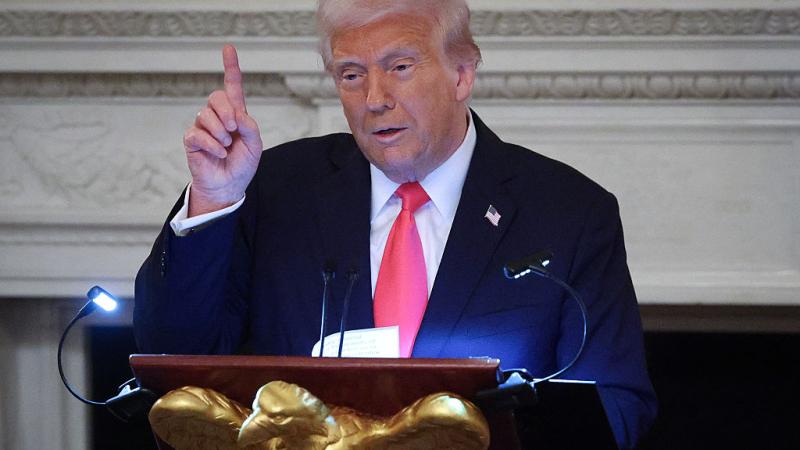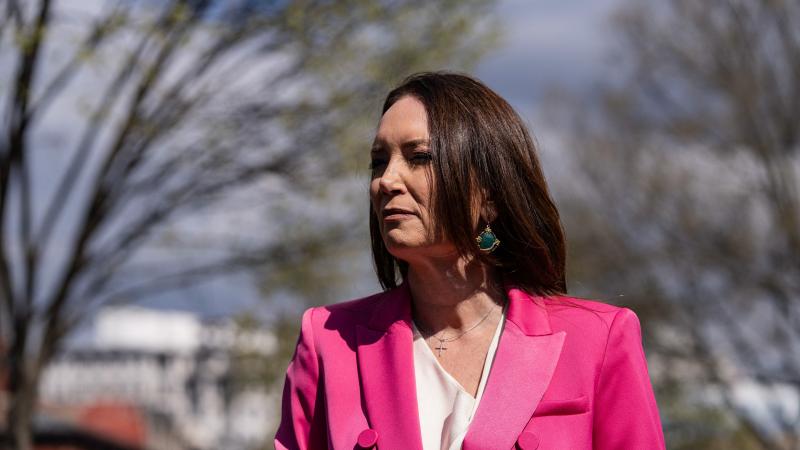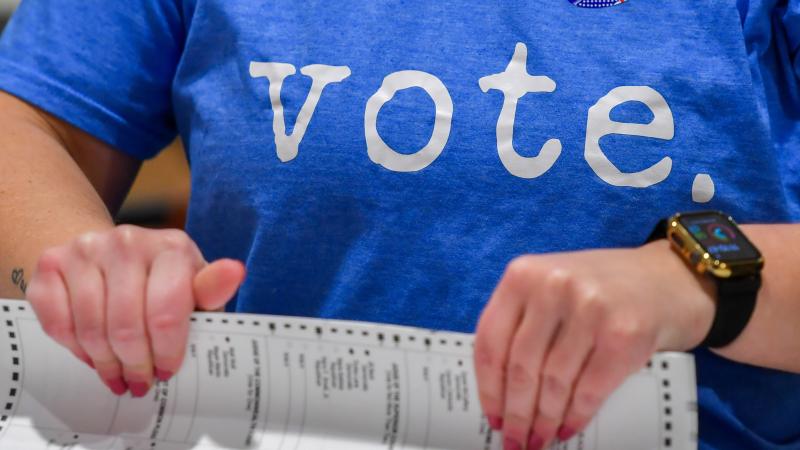Democrats replay politics of personal destruction to discredit censorship watchdog at hearing
"Everything looks like a conspiracy when you don't know how anything works," Mary Poppins of misinformation Nina Jankowicz, former head of Disinformation Governance Board, tells lawmakers.
At a congressional hearing Tuesday on the State Department's role in allegedly censoring Americans in the guise of fighting foreign propaganda, Democrats reached back for a favorite tool against award-winning journalists who testify as Republicans' witnesses at such hearings: the politics of personal destruction.
They went nuclear on Twitter Files journalist Matt Taibbi two years after smearing him as an unethical hack and threat to physical safety – for reporting on the pre-Elon Musk platform's communications with the feds on suppressing disfavored narratives – and science journalist Nicholas Wade as a racist to discredit his testimony on the COVID-19 lab-leak theory.
House Foreign Affairs South and Central Asia Subcommittee Ranking Democrat Rep. Sydney Kamlager-Dove, of California, accused Republicans of elevating a "serial sexual harasser" based on eight-year-old hit pieces against Taibbi at the height of #MeToo, which themselves relayed personal anecdotes from the early 2000s, in her opening statement.
Democrats unsuccessfully leveled similar accusations a year later against Supreme Court nominee Brett Kavanaugh based on the anecdotal testimony of Christine Blasey Ford about the future justice's behavior one night decades earlier.
"You can see the tone and tenor of what's going to be happening today, sadly," Subcommittee Chairman Bill Huizenga, R-Mich., told Taibbi after Kamlager-Dove's statement.
Republicans had their own accusations against Democrats' lone witness, Nina Jankowicz, the short-lived head of the Department of Homeland Security's slightly longer-lived Disinformation Governance Board, known for her Mary Poppins-style videos explaining misinformation.
Huizenga called her the "disinformation czarina" and said her American Sunlight Project is ironically named because it's a "dark money group" that refuses to disclose its donors, continuing Republicans' sustained scrutiny of her efforts.
She founded the "bipartisan" nonprofit watchdog, whose mission is "increasing the cost of lies that undermine our democracy," shortly before Jankowicz lost her defamation lawsuit against Fox News last year.
Huizenga said Jankowicz's own claims sound like conspiracy theories, including that Hunter Biden's abandoned laptop was a "fairy tale," the discredited Steele dossier provides "great historical context" and the so-called censorship-industrial complex is fictional.
The chairman said the committee would examine the public diplomacy functions of the State Department, particularly the "R family" of bureaus and offices, as part of its first reauthorization of the agency in more than 20 years.
The committee is especially keen on discerning whether the Counter Foreign Information Manipulation and Interference Hub (R/FIMI) is simply a rebrand of the Global Engagement Center, which a former State official dubbed a "censorship nerve center" for the feds.
Congress declined to reauthorize GEC last year after exposing its "shadowy network of grantees and subgrantees" that censored American voices that "refuse to align with the left-leaning establishment politics," Huizenga said. He plans to offer a bill that would codify President Trump's First Amendment executive order.
Kamlager-Dove said Republicans were "wasting taxpayer time and resources on the fifth such hearing" on the so-called censorship industrial complex, "relitigating a made-up conspiracy theory" about a defunct agency to distract from its "dumpster fire foreign policy" and Trump's raids on college campuses "to silence thought and dissent of the students."
Both the chair and ranking Democrat made goofs at the first subcommittee hearing, with Huizenga launching into questions before witnesses gave opening statements and Kamlager-Dove calling for "more real partisan solutions" against propaganda.
Jankowicz came out swinging against the "fiction" of the censorship-industrial complex and the campaign against it, which has threatened her life, national security and the First Amendment itself. "Research is speech, government-funded or not," she said.
The Twitter Files are "riddled with errors and outright falsehoods" from selectively edited conversations, distracting from real threats like a pro-Russia aggregator that pushes out millions of pieces of content to "poison" large language model-powered chatbots, which Jankowicz twice said her watchdog had exposed.
Taibbi recited the evolution of GEC, created by President Obama's executive order but stood up in the first Trump administration, from counterterrorism targeting the Islamic State to policing "domestic English-language accounts" with no ties to terror groups or adversary nations who were discussing COVID and the 2020 election.
He noticed a red flag in the Twitter Files this weekend he had missed, a February 2020 conversation among Twitter executives on whether they should ask GEC to stop going to the media with "sensationalist claims of epidemics of foreign bots."
One executive mentioned The Washington Post gave Twitter "no heads up" before claiming Russia was helping Sen. Bernie Sanders, I-Vt., in the 2020 presidential campaign.
Taibbi also noted former Twitter executive Yoel Roth's denigration of GEC's claims and its alleged method of mixing a "smattering of real Russian accounts with a crowd of mostly American, mostly anti-establishment accounts" to create "the appearance of Russian social media backing" for a wide variety of narratives.
GEC's purpose was giving domestic propaganda the appearance of a counterterrorism operation, using the "fellow traveler" concept from the House Un-American Activities Committee," Taibbi said. "They were looking for orthodoxy and unorthodoxy."
The fact that Roth was "throwing shade" at GEC actually shows Twitter was not a helpless pawn of the feds but simply enforcing its terms of service, Jankowicz retorted. Taibbi said she left something out: Twitter succumbed to a year of badgering by the "incomptent" GEC by letting the group into its regular "industry meetings."
RealClearInvestigations contributor Ben Weingarten said GEC's cultivation of "hundreds of ostensibly nongovernmental counter-disinformation players" like NewsGuard and the Global Disinformation Index "should have raised immediate alarm bells" because the federal "imprimatur" went to these "would-be destroyers of disfavored domestic outlets."
Their rankings of purportedly safe and risky news, which cost primarily conservative outlets tens of millions in ad revenue, were "uniquely perverse" for RealClearPolitics – deemed to have an "undisclosed conservative bent" – because its purpose is "curating compelling analysis" across ideologies and it's rated "center" by media-bias analyst AllSides, Weingarten said.
The purpose of the news rankers is setting up brands for boycotts and attacks by progressive groups if they advertise in the wrong place, he said.
Kamlager-Dove set up Jankowicz to pronounce whether State has ever funded suppression of domestic speech, contrasting the claim with Rolling Stone's report that Twitter kept a "database" of GOP requests to censor posts.
"Everything looks like a conspiracy when you don't know how anything works," Jankowicz responded, referring to Taibbi's admission that he didn't initially understand the Twitter Files he was reviewing and her own experience managing State grants.
State was actually funding the tracking and countering of Chinese propaganda targeting Americans, and NewsGuard gave some "conservative" outlets positive ratings, she said, referring to a Senate letter last week. Complaining about its ratings is like "a restaurateur who got a bad review" in the Post.
Rep. Scott Perry, R-Pa., questioned how Jankowicz could point to parallels with McCarthyism when she was unfamiliar with the "Venona intercepts," which he said showed that the targets of Sen. Joe McCarthy's purge were "subversive communists" in the government.
Jankowicz had another heated exchange with Rep. Keith Self, R-Texas, who repeatedly pressed her on "the right of the state to form public opinion."
He pointed to her comments three years ago about the consequences of letting "free speech absolutists" take over platforms. "We need the platforms to do more, and we frankly need law enforcement and our legislatures to do more as well," she said then, which Jankowicz said Tuesday referred to threats against her.
The government also has First Amendment rights, she told Self, pointing to a federal court ruling that NewsGuard was not an "envoy of the state."
The March 26 ruling against the $13.6 million defamation lawsuit by left-leaning Consortium News found that the publisher argued "virtually no non-conclusory allegations of actual malice" by NewsGuard and ignored queries about "the accuracy of its reporting."
Jankowicz denied Self's claim that the suppression of the Hunter Biden laptop story was the best example of the government trying to shape public opinion, because "when Twitter decided to add friction … it actually got more views."
The Facts Inside Our Reporter's Notebook
Links
- award
- winning
- smearing him as an unethical hack
- science journalist Nicholas Wade as a racist
- eight-year-old
- hit pieces
- short-lived head
- slightly longer-lived Disinformation Governance Board
- Mary Poppins-style videos explaining misinformation
- Republicans' sustained scrutiny of her efforts
- "bipartisan" nonprofit watchdog
- Jankowicz lost her defamation lawsuit against Fox News
- The chairman said the committee
- Counter Foreign Information Manipulation and Interference Hub
- "censorship nerve center" for the feds
- Congress declined to reauthorize GEC last year
- Yoel Roth's denigration of GEC's claims
- RealClearInvestigations contributor
- rated "center" by media-bias analyst AllSides
- Rolling Stone's report
- Venona intercepts
- her comments three years ago
- March 26 ruling
- $13.6 million defamation lawsuit by left-leaning Consortium News















